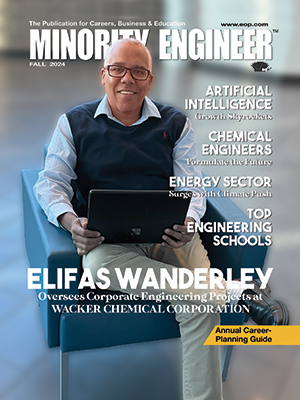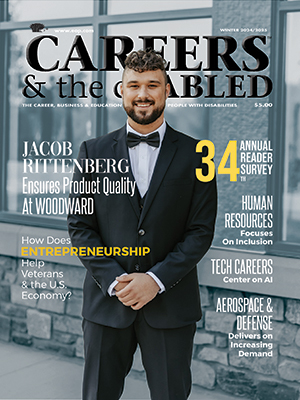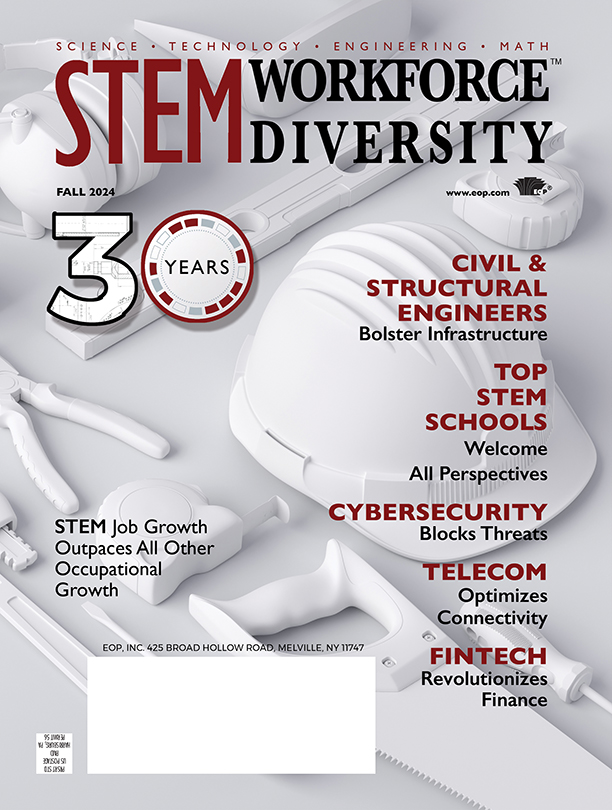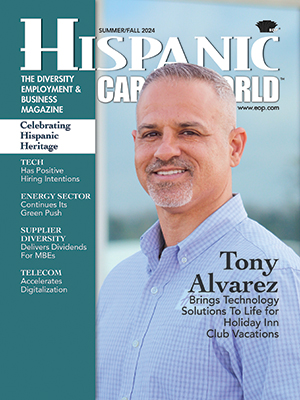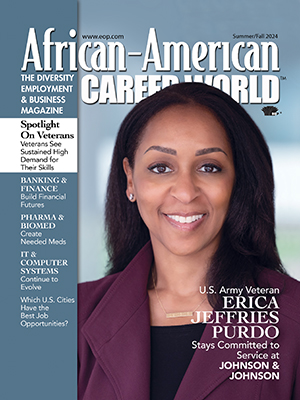By Katie McKy
Healthcare IT and informatics continues to grow as increasingly more patient information is digitally recorded and the demand for specialists who can manage all of this data continues to expand.
Adams Makes a Difference for Patients & Providers at OSU Wexner
Denzel D. Adams, an information technology (IT) service support technician for The Ohio State University (OSU) Wexner Medical Center, didn’t take the typical route to becoming an IT professional. “I started as a truck driver in Buffalo, NY, and moved to Columbus, OH and into IT,” he explains.
But once he arrived in IT, he thrived. “OSU has done a lot for me. It’s given me wide exposure to the IT world, working across the broad range of IT opportunities, from installing computers and basic electrical devices used in IT to working at the help desk on the university side. I’ve even stepped a little outside of the IT role, such as patient coordinator,” he elaborates about the varied roles and responsibilities he’s had so far.
Adams’ titles have been help desk, patient access coordinator, desktop technician, and, now, IT service support technician. “OSU offers such flexibility, so your work always feels fresh and challenging,” he points out.
And what does he do in his current role? “I maintain and service our integrated health information system (IHIS) for our providers and healthcare personnel. IHIS is our medical records system that a lot of organizations around the nation use. I troubleshoot and maintain that, such as getting a brand-new printer to be in compliance with the software,” he details.
Adams works alongside more than 24,000 employees at OSU Wexner. Want to join this dynamic workforce? He offers some insight into who gets hired: “You need to have the inclination the ability to learn. You don’t have to know everything coming in, but you do have to have curiosity, to wonder how something works, and to then ask those questions, to watch, and to learn.”
Adams loves the challenges in IT. “If you hate boring days, then this is your career. No day is like the prior day. Every day is a new challenge, but not in a bad way.”
Adams has learned that your attitude is key to your success. “It’s all about your perspective. You’re forever learning, and forever starting at the bottom and working up. That can be scary, and that’s especially so for me because I like to be the one with answers.”
It’s essential to find the answers when you don’t have them so that you’ll move forward, just as Adams has. “Be persistent. There are no dumb questions. Ask as many questions as you can. Don’t worry how you’re perceived because everyone is more than okay with helping. People here love it when you ask questions. Just don’t be overconfident, or you’ll be humbled very quickly.”
In addition to the invigorating challenges, camaraderie, and daily learning, Adams also enjoys a particular IT perk. “What drew me to IT is the flexibility for a work-life balance. This industry and OSU Wexner fully support that. I’m able to have a life outside out of work. Work is over when your shift is done. You don’t take your work home with you, and my manager does a great job of making sure that we don’t burn out,” he elaborates.
The balanced life leaves time for Adams’ family and higher education. It also leaves time for fun with his colleagues. “A lot of us hang outside together away from work,” he adds.
However, the best part of his career might be the importance of his work.“I love being able to help patients. My job allows me to contribute to patient care. Someone might submit a wrong image on a patient chart. They might call me all upset because that mistake can be a big deal, but I get to calm them and let them know that I can fix it.”
So Adams gets to contribute to patient care, and to also contribute to provider care. “We’re all humans, and we all make mistakes. Caring for others has always been important to me. I can’t work with needles, but I can help doctors and providers in this absolutely essential way and make a difference in patients’ lives. There’s no better feeling than that,” he concludes.
Learn about Columbus, OH-headquartered OSU Wexner via Facebook, X and Instagram. Explore careers at wexnermedical.osu.edu/careers/current-openings.
Reyes-O’Day Collaborates on Strategies & Solutions That Help UnitedHealthcare Group
Adriana Reyes-O’Day is the director of technical product management at UnitedHealthcare Group. “We focus on understanding our stakeholders’ problems to strategize and drive high-impact solutions,” indicates Reyes-O’Day, who adds that those high-impact solutions are reached by openness and diverse input.
“It’s all about listening to the problem. I work with a lot of skill sets: architects, engineers, product owners and managers, and analysts, and we all play a role in defining the solution,” she continues.
Reyes-O’Day can never predict which discipline will realize the solution. “Sometimes it’s one profession and sometimes it’s another. We need the diversity of collaborative minds coming together,” she explains.
It gets tricky when there are multiple potential solutions. “Sometimes there’s no one right answer,” she further notes.
And sometimes the solution isn’t obvious at first, according to Reyes-O’Day. “Something that might seem really crazy at first can be our starting point for innovation.”
Whatever the challenge, she enjoys the process and its purpose. “What I enjoy most about my job is the opportunity to dive into a problem area and collaborate on strategizing solutions that make lives better for our members, customers, and peers. I get to be inquisitive on a daily basis, and I have a voice in bringing the right minds together to address these problems,” she reflects.
Realizing a solution isn’t always a challenge. “Sometimes the solutions are simple.”
And sometimes the solution requires persuading others to do something differently. “We sometimes challenge how things were done before.”
But the purpose makes it all worthwhile. “The excitement is in seeing the solutions come to life and hearing of the impact they are having on others’ lives,” she adds.
If you, too, want to work in IT and at UnitedHealthcare, Reyes-O’Day delineates what is needed in seven words: “Adaptability, relentlessness, and curiosity/desire to learn.”
If hired, then you’ll likely receive a world of support. “I love the support I have, and continue to receive, from leadership to pursue my interests and discover my own career path. There are many opportunities to explore and learn from within the company. This has allowed me to develop subject-matter expertise in different areas that continue to challenge me.”
Meeting challenges took her to the perfect position. “It took me a while to find technical product management, an area in which I really thrive. Leadership really encouraged me to try the role. I love the strategy side of healthcare. My business team and I really get tactical in addressing a problem today and in the future.”
To reach the perfect place, she had to overcome early challenges. “During my last few years at Worcester Polytechnic Institute, I didn’t know what kind of career I wanted to pursue. I’d been studying electrical and computer engineering, but wasn’t particularly excited about a role in that field.”
So she broadened the playing field. “I started to pursue a minor in business, which opened my eyes to opportunities within STEM that could tap into other skill sets of mine that I was more interested in leveraging. When my job search started, my willingness to explore any alternative that leveraged such skills led me to research jobs across a variety of roles.”
That led to UnitedHealthcare. “An opportunity in its technology development program allowed me to experience a variety of roles hands on and then decide what final placement I’d like. I embraced this opportunity with a curious mindset and willingness to explore new roles.”
Reyes-O’Day now enjoys a job with challenges that compel growth. “I might enter a challenge knowing next to nothing about the problem, but I enjoy the learning along the way. I have to ask questions, and I love that.”
She encourages you to stretch yourself, too. “Don’t shy away from opportunities outside your current skill sets. The best way to learn is by being willing to try new things.”
And tap the power of change. “The one constant in my career experience has been change. To thrive in any of the opportunities that came my way I had to be willing to adapt and use my curiosity to persevere,” she concludes.
Learn about Minneapolis, MN-headquartered UnitedHealthcare via X, Facebook, Instagram and LinkedIn. Explore careers at unitedhealthgroup.com/careers/en/work.html.
Sivasegaran Leverages Tech to Improve Lives at Baxter
As the vice president, platform engineering and architecture, digital platforms and innovation for Baxter, Vasee Sivasegaran helps Baxter’s customers address their patient care challenges and achieve their mission by building and supporting healthcare digital technology solutions.
“Information technology (IT) and connected care solutions shape how patient care is provided by influencing patient and provider experiences, lowering the cost of care, improving patient outcomes, and increasing health equity,” he notes about the field and his job at Baxter.
Sivasegaran loves the challenges in healthcare IT. “My job provides me with tremendous opportunities to solve difficult problems by leveraging my biological science education and my vast IT experience. It allows me to deeply understand the problem and come up with creative technological solutions to address it.”
Sivasegaran and his team are in the middle of such a challenge right now. As he explains: “We’re working on finding solutions that simplify clinician work flows and bring providers the insights they need so they can spend more time caring for patients. The sense of satisfaction and ability to influence someone’s life, whether it’s a care provider, patient, or one of my own teammates, is a tremendous boost to my morale and it reassures my value system.”
To reach his lofty perch where he finds career satisfaction, Sivasegaran’s career track swerved. “When I was in college, my career aspiration was to become a dentist, and my educational foundation was based in biological sciences,” he shares.
Upon graduating he made the difficult decision to change trajectories toward a career in IT. “While the initial perception was that the two fields couldn’t be farther apart, I was surprised to learn that, ultimately, one uses the same analytical, critical thinking, and problem-solving skills in both fields. I stayed the course and kept the faith that my decision and hard work would result in a fulfilling career,” he reflects.
Despite the overlap, more learning was required.“With the help of technology certifications and a graduate degree in business and information systems, I’ve been able to enjoy a 28-year career in IT. Ultimately, I learned that the art of learning can be applied in any field and industry as long as you learn to use the core skills built in early education,” he indicates.
So why did Sivasegaran make the big switch? “IT is prevalent in all industries, and it plays a pivotal role in how organizations and businesses function. It’s positively shaped major advancements in many industries, and it’s the key to success.”
This is even more true in the healthcare industry where the pressures of quadruple aim – improving the health of the population, improving the patient experience, reducing costs, and improving care team well-being – are challenging even the oldest and financially stable healthcare organizations.
If you’d like to join the healthcare industry as a STEM professional helping to achieve this quadruple aim Sivasegaran describes, then he has some insight into what it takes, and he shares the specific traits when hiring someone to join Baxter’s global workforce of 60,000.
“I emphasize characteristics of energy and attitude over aptitude in my employees since aptitude can be taught while the former two are internally motivated. I also look for employees with a strong moral compass and value system,” he reveals.
“With these characteristics the employee is bound to overachieve and contribute positively to their teams and the organization.”
If you’re hired, then your work will be life-changing and life-saving, according to Sivasegaran.
“I have the opportunity to witness the positive effects we have on patient lives through the work we do, and there’s no better sense of satisfaction and gratitude that can be achieved in other industries. We live our mission daily – to save and sustain lives – while meeting our own professional and personal goals,” he concludes.
Learn about Deerfield, IL-headquartered Baxter via LinkedIn, X, Facebook and YouTube. Explore careers at baxter.com/careers.
Grant Uses Data & Analytics to Advance Humana’s Culture
Michela K. Grant, PMP, MBA is a senior product owner, people analytics at Humana. As such, she manages the design and development of digital dashboards for the people analytics team to support them in analyzing data and identifying strengths and opportunities so the company can continuously improve the employee experience.
One of approximately 67,000 employees, Humana has a smorgasbord of roles, but certain, key characteristics are needed for every position, according to Grant. “We seek individuals who embody our values: caring, curious, and committed.”
This is because healthcare is a caring business, and curiosity and commitment improve the quality of that caring. “Curiosity allows us to learn how to better serve our members, patients, and fellow employees. Our commitment is conviction to our purpose,” she adds.
Grant loves her colleagues, working at a place with such profound purpose, and her work itself. “I love having the opportunity to grow and learn at Humana, which means the world to me as a life-long learner who’s passionate about using data and analytics to advance a culture of belonging and care for employees.”
Humana helps Grant to improve, too. “There are education benefits that allow employees to take asynchronous, college-level courses and many professional development programs free of cost, as well as a yearly tuition reimbursement benefit that covers up to $5,000 of education expenses. Training on new systems helps us keep up in the global economy,” she notes.
To reach such a good place in her life, Grant had to overcome a challenge. “I came from a background in sociology before making the leap to attend a now STEM-certified MBA at Simon Business School at the University of Rochester. I deeply believed that human resources (HR) data held useful knowledge and patterns. However, I didn’t feel proficient yet to fully grasp the mathematical analytics and concepts, and leverage the data.”
What was daunting became even harder for her. “The challenge came to a head when I took my first business analytics class and encountered statistics, as well as the SQL and Python programming languages,” she recalls..
She was afraid to admit to intimidation to the group in her class, and asked to only be responsible for formatting their weekly presentations. Then she realized she had to take the plunge. “I realized that if I didn’t lean in, if I didn’t push myself, then I’d be letting my dream go of elevating human capital resource with data. I asked for help,” she shares.
A classmate laid out the concepts. “It became clear that I could understand and translate analytics in my way, through seeing it as a language and art form for understanding the world. Analytics is essentially a way to understand that the world around us is data-based, and I’ve never backed down from a STEM challenge since.”
Grant has found that her non-STEM beginning serves her in her STEM career now. “As a senior product owner, my background in liberal arts has made me an excellent systems thinker and communicator, with the ability to analyze complex issues and make connections in data that allow holistic and wide-scale improvement.”
Her business background also boosts her. “It helped me learn the language and leadership needs of a business.”
And her years as a senior data scientist nurtured her analytical skills and desire for in-depth inquiry and information. “Now working with information technology (IT) teams in Agile processes combines all of my backgrounds and skills to help me be a well-rounded analytics translator and digital product owner,” she believes.
Whatever your background, Grant feels that there are things all professionals should do. “Cultivate mentors along the way and make sure that there are people in your organizations who know your highlight reel of accomplishments and who will vouch for you when you’re not in the room. Develop genuine relationships with leaders in the company. These people are called sponsors, and they’re the people who will help you.”
Learn about Louisville, KY-headquartered Humana via Facebook, X, LinkedIn and Instagram. Explore careers at careers.humana.com.
Jones Takes the Informatics Leap at IU Health
Genevie Jones is the executive director and chief of staff, information services at Indiana University Health (IU Health). There she orchestrates strategic initiatives, fosters cross-functional collaboration, and helps enable technology to advance IU Health’s goal of making Indiana one of the healthiest states in the nation. She’s one of approximately 38,000 employees, all connected by core values.
“IU Health is a values-based organization so it seeks individuals who embody the core values of excellence, purpose, team, and compassion, as demonstrated via their everyday actions with patients, families, and colleagues,” she indicates.
It’s important work, and Jones never forgets it. “I’ve been a part of the team at IU Health for almost 20 years now, and I must say that the organization’s mission truly inspires me. It’s not just a set of words on paper. It’s evident in our support for the Indiana communities we serve.”
The shared and profound purpose has led Jones to form strong relationships with her colleagues. “These friendships have transcended our workplace walls. Plus, I’m grateful for the opportunities that IU Health has given me to pursue and accomplish my personal and professional goals. Even in challenging times, I can say that I’m proud to serve at IU Health.”
Jones has found her calling in informatics, but she hasn’t always worked in informatics. “As a 19-year-old college student, I joined IU Health as a file clerk out of necessity. I needed a job. I stayed on because the healthcare field truly fulfills my sense of purpose and brings satisfaction to my work.”
Change atop change came. “One of the pivotal decisions I made in my career was transitioning from my role as a radiation therapist to the dynamic field of informatics/information security (IS). Although my curiosity fueled this shift, I was afraid to leave my area of expertise behind.”
Jones had to face her fears and embrace a combination of fear and curiosity. A little help from friends and family was key for her.
“I had mentors inside and outside my organization who provided invaluable guidance, shared their experiences, and offered insights into the nuances of the informatics domain. Their perspectives played a significant role in boosting my confidence and competence in this uncharted territory,” she recalls.
Her family also had her back. “My family’s unwavering support played a vital role in navigating this challenging phase. Their encouragement and understanding gave me a stable foundation during a period marked by significant change and uncertainty.”
Ultimately, the transition became transformative. “It set me up for my current role as executive director and chief of staff. Overcoming my initial fears with the help of mentorship and a robust support network allowed me to thrive in my role as a clinical informatics analyst. My challenges catalyzed significant personal and professional growth, highlighting the importance of resilience, curiosity, and a strong support system in navigating intricate career transitions,” she reflects.
If you’re looking for work, then Jones tenders some advice: “Prioritize skills beyond what you learned in the classroom. And take time to acquire skills like networking, refining your executive presence, and understanding your motivations and decision-making processes. It’s important to realize that your degree alone doesn’t define your professional path.”
In Jones’ early career, she discovered the versatility of her knowledge and relational skills, which helped her secure roles in diverse areas such as IT and operations.
“Intentional networking played a significant role in my career journey. Many opportunities arose through my network, highlighting the importance of expressing your interests to others. You don’t need a perfect, defined plan. You just need to be willing to put yourself out there. Remember, rejection is merely a redirection,” she encourages.
Learn about Indianapolis, IN-headquartered Indiana University Health via Facebook, X, Instagram, LinkedIn, YouTube and Pinterest. Explore careers at careers.iuhealth.org.
A Growing Sector for STEM Pros
Health informatics – also known as healthcare informatics- refers to the intersection of healthcare, information technology (IT) and data management. It’s motivated by the need to create innovative solutions that enhance the quality and safety of patient care while managing costs, promoting the advancement of public and population health, and supporting biomedical research and population data. This multidisciplinary field of healthcare IT and informatics is expected to expand significantly during the next few years because of the high demand for these roles in healthcare.
Health informatics professionals cover a broad spectrum of roles within the healthcare industry, from specialized positions like data analysts and applications specialists to managerial roles such as data quality managers. These various opportunities cater to individuals with an enthusiasm for data-related work who aspire to contribute their skills in a healthcare setting. Whether you’re a STEM professional who’s inclined toward analyzing health data, developing applications, or ensuring data quality integrity, healthcare IT and informatics offers a rich array of positions suitable for data enthusiasts seeking meaningful roles in healthcare.
As such, the demand continues to increase for STEM professionals in this field. Indeed, the outlook for career opportunities is rosier and rosier, with the U.S. Bureau of Labor Statistics (BLS) projecting a 17% increase in IT and informatics careers in the healthcare sector. This is much greater than the average projected growth for nearly all other careers because as healthcare companies continue to digitize their operations, they must bring increasingly more IT professionals aboard.
And they can make a pretty penny, too. Overall, professionals in the field typically command competitive salaries, a testament to the high demand for their specialized skills. For instance, the average salary for someone with a master’s degree in information security applying their tech expertise to healthcare is nearly six figures and the benefits are top-tier, too. And managers and specialists occupying key roles can expect to earn substantial incomes, with salary ranges falling between $90,000 and $100,000. The specific compensation depends on factors such as education level and professional experience, highlighting the rewarding financial prospects available to those with expertise in informatics.
With the relentless advancement of technology, the expected surge in demand for health informatics professionals is on the horizon. Additionally, the ever-evolving healthcare landscape increasingly relies on data-driven, decision-making processes, underscoring the pivotal role skilled individuals play in healthcare IT and informatics. These professionals are crucial architects of the future healthcare system where their ability not only meets current demands, but also pioneers the data-centric strategies shaping the trajectory of the entire industry.
Staying informed about the latest trends in informatics is crucial for professionals in the field. Today’s informatics professionals are shaping the healthcare industry’s future by adopting cutting-edge technological innovations in the medical industry. Since the federal mandate for healthcare industries to transition to electronic health records (EHRs), more patient data has been generated than ever before. The science of health informatics and the associated IT aims to manage current technology and create new technology to harness this unprecedented access to information to improve human health.
Captions & Callout Quotes:
Denzel D. Adams is an informationa technology (IT) service support technician for The Ohio State University (OSU) Wexner Medical Center.
“I love being able to help patients. My job allows me to contribute to patient care….I [also] can help doctors and providers in this absolutely essential way and make a difference in patients’ lives. There’s no better feeling than that.”
Adriana Reyes-O’Day is the director of technical product management at UnitedHealthcare Group.
“What I enjoy most about my job is the opportunity to dive into a problem area and collaborate on strategizing solutions that make lives better for our members, customers, and peers. I get to be inquisitive on a daily basis, and I have a voice in bringing the right minds together to address these problems….I love the strategy side of healthcare. My business team and I really get tactical in addressing a problem today and in the future.”
Vasee Sivasegaran is the vice president, platform engineering and architecture, digital platforms and innovation for Baxter.
“I have the opportunity to witness the positive effects we have on patient lives through the work we do, and there’s no better sense of satisfaction and gratitude that can be achieved in other industries. We live our mission daily – to save and sustain lives – while meeting our own professional and personal goals.”
Michela K. Grant, PMP, MBA is a senior product owner, people analytics at Humana.
“Curiosity allows us to learn how to better serve our members, patients, and fellow employees.”
Genevie Jones is the executive director and chief of staff, information services at Indiana University Health (IU Health).
“One of the pivotal decisions I made in my career was transitioning from my role as a radiation therapist to the dynamic field of informatics/information security (IS).”



